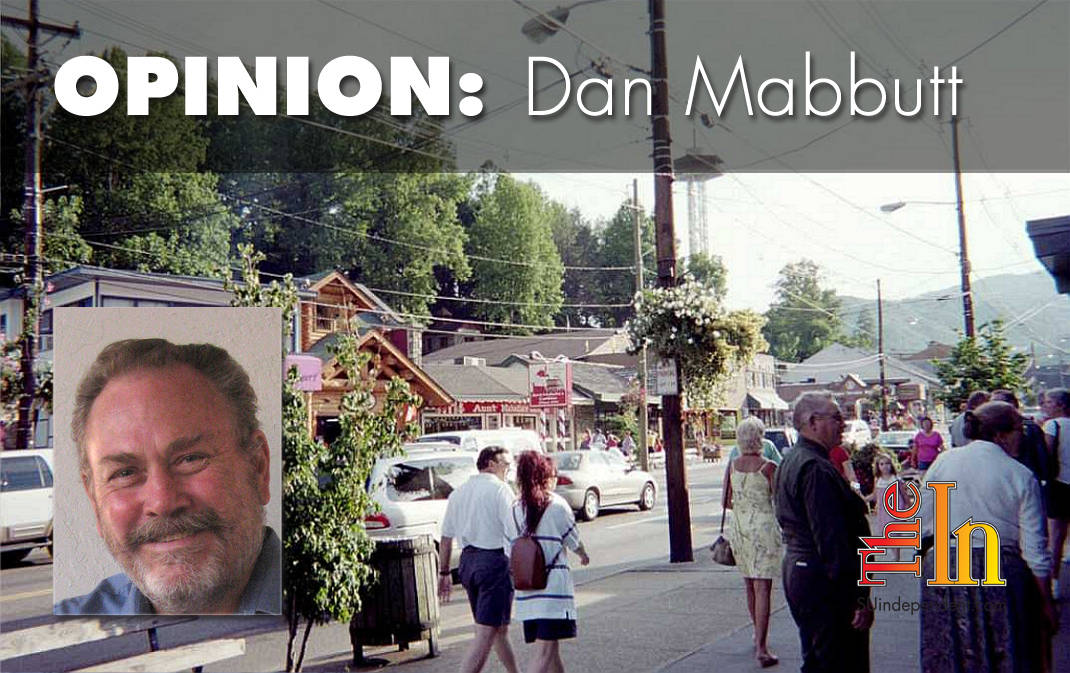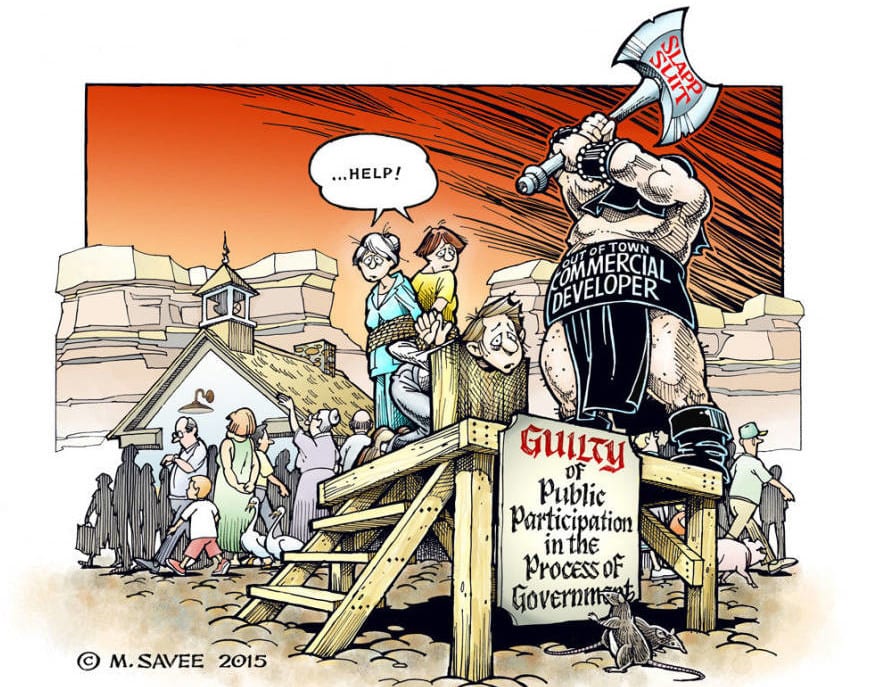
Two lawsuits by developers against towns have concluded recently. Both never should have happened: the Izzy Poco suit against the town of Springdale and the Zion Sunset Resort SLAPP lawsuit against the town of Virgin. I’m sure there are others, but I know a lot about these two.
In the first, a developer wanted to open a Subway fast food outlet near the Zion Park entrance. Years ago, Springdale invested quite a bit of time and money developing ordinances that effectively outlawed this type of business with the goal of preserving the “village atmosphere” of the town. Springdale does not want to turn into another West Yellowstone or Gatlinburg.
Springdale lost—big time. After five years of litigation, Springdale had to repeal their ordinance and pay $787,000. They surrendered because their insurance company notified them that they would drop their policy if they didn’t. In other words, Izzy Poco bludgeoned Springdale into submission with money. Most residents have now decided that the town they loved and wanted is a lost dream.
 So far, Virgin is doing better, but the struggle probably isn’t over and it hasn’t gone completely the way it should have. In Virgin, Zion Sunset Resort wanted 56 acres right in the middle of the town to be rezoned so there would be few rules about what could be done there. A trailer park would have been on part of it but the commercial zone the developer wanted would have left the door wide open to just about anything.
So far, Virgin is doing better, but the struggle probably isn’t over and it hasn’t gone completely the way it should have. In Virgin, Zion Sunset Resort wanted 56 acres right in the middle of the town to be rezoned so there would be few rules about what could be done there. A trailer park would have been on part of it but the commercial zone the developer wanted would have left the door wide open to just about anything.
A citizens group has stopped the developer, so far, by passing a referendum reversing a decision by the Town Council to grant the zone change. But it has cost a lot of money for the town and for individuals to get to this point. After extensive litigation, the developer lost one case (against the town of Virgin) and settled out of court on another (against the “Virgin Three”). The terms of the settlement specify that the Virgin Three can’t disclose the terms, specifically how much money changed hands. But the smart money is betting that the Virgin Three—three brave and self-sacrificing citizens of Virgin who have nothing to gain except the community that they loved and wanted—are still on the hook for at least part of their legal defense. They have a GoFundMe site to collect donations if anyone is interested in helping them out.
There are several lessons to be learned from these two cases. The first and most important is that the ability of the affluent to use money in the court system to bully and control us is, to use a legal term, “a clear and present danger.” In both cases, I learned that the law fully protects the ability of someone to make money on their land no matter what it does to destroy the things that neighbors value. A developer showed up in a planning commission meeting in Springdale and said, “You can’t stop people from making money from their property!” And you can’t. Not in Utah, anyway.
The next lesson, however, is illustrated by the difference in the way the battles were fought. Springdale kept everything a big secret for five years until they were outlasted and outspent and the battle was lost. People in Springdale were shocked when it was suddenly announced that they had lost. In Virgin, ordinary people united, brought the whole controversy out into a public arena, and worked together. So far, Virgin has done a lot better.
The “New York Times” recently ran an eye-opening article about how the suddenly widespread use of “arbitration clauses” in consumer contracts is eliminating our ability to fight big money corporations no matter what they do wrong. Unless there are at least thousands of dollars at stake, it doesn’t make sense for any individual to take on the legions of lawyers that a corporation can throw at you and endure the years that the case will drag on. Being in the right simply isn’t enough. The only way you and I can press a hundred-dollar claim is to become part of a class-action suit. Then it’s worthwhile for lawyers who sue corporations for a living to take on your case along with millions of others. You might get a few pennies on the dollar back that way. But the lawyers (on both sides) get filthy, stinking rich no matter who wins or loses.
Arbitration clauses remove the ability to sue. The result of signing one (often just by clicking on a webpage) is that you can’t even be part of a class-action suit anymore. The “Times” includes numbers that show that arbitration seldom works for the little guy. Now that nearly every consumer contract includes an arbitration clause, we’re just stuck. The “Times” documents cases where corporations are transparently lying and injuring people, but it doesn’t make any difference. The arbitration clause is called the “get out of jail free” clause for big money.
“Justice delayed is justice denied” is a legal principle that seems to have been completely forgotten. When Izzy Poco first filed suit against Springdale, the town was confident that they would win. But as the years and legal fees mounted, that confidence evaporated. The case languished in one court without a verdict for years. Why does it take so many years for a case to be decided? The answer is the one made famous by Watergate: “Follow the money.” Who benefits from dragging things out for a decade or more? First, lawyers on both sides and second, big money that can win simply by outlasting you. If you give up, like Springdale had to do, they win.
It’s popular in political thought these days to trash the government. Consider the case of Bernie Madoff. He created the biggest “Ponzi Scheme” investment fraud in history by taking advantage of individual people to steal $17.5 billion from 4,800 clients. These clients lost that money by trying to take advantage of what they thought was a restricted, privileged deal that ordinary people couldn’t get in on. They would have lost it all if the government hadn’t stepped in. Big, bad government bureaucrats have now recovered roughly 60 percent of the money those individuals lost.
In last week’s column, I moaned and groaned about how we don’t talk anymore. If there is any way that we can take our country back from big money, it lies in learning how to work together again. Today lawyers, corporations, and big money roll over us individually using the courts as their bulldozer. A bundle of rods called a “fasces” was once a symbol of American unity. (You can still see it in the main chamber of the House of Representatives in Congress, on the Mercury dime, and on Lincoln’s seat in the Lincoln Memorial.) The idea is that a single rod is easily broken, while a bundle is strong. When I say, “Big money is taking us apart,” that’s what I mean. We don’t unite to fight big money anymore. They’re breaking us individually like little sticks.
We can’t stand tall as individuals and take on the world independently. The essence of civilization is that we can only accomplish our goals by working together. America seemed to know that once, and I’m wondering if we have forgotten that fundamental truth today.




Excellent article Dan. You have summed it up in a nutshell. When a litigant has more time, money, and resources than his opponent, he usually wins in any court.
Well said… Ignorance of the law is not an excuse… We have so many laws and regulations in this country and the legalise is so complicated it has turned lawyers and those who can afford them into a privileged class. . I have two bookshelves of law books… Doesn’t matter…. You need a warchest as a backup. Lawyers are selling AMERICA out. Not all of course… Meanwhile 10,000+ new lawyers gradusting this year from law school… The legal system has become a con game… The common man is helplessly out matched… God bless the good lawyers out there especially those who stand up for civil rights and the poor… as well as those who put criminals behind bars. Great article… I wish there was a solution other than lawyers vs. lawyers…
Thanks!
The irony of the only solution to lawyers seems to be more lawyers did not escape me while I was writing this. Like you, I don’t have a simple answer either. My opinion is that it’s something like “how to be healthy”. The main answers are:
1 – Have good genes
2 – Be lucky
3 – Start 5O years ago and only eat kale and exercise a couple of hours each day
That doesn’t work for you because you’re unhealthy now? Sorry. I guess you’re SOL.